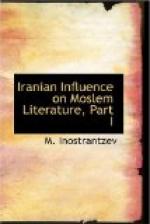For the History of the Arabs of that period Tabari has used a variety of other sources, most prominent among them being Muhammad Ibn Ishak who is better known as the biographer of the prophet. In this section of Tabari’s great work mediately or immediately a large amount of diverse information has been brought together.
It is certainly desirable and to be hoped that the criticism of the sources in this domain would make substantial progress. But the point of greatest moment even here is to test every incident or piece of information according to its origin and credibility as I have endeavoured to do in the footnotes.
APPENDIX VI
LETTER OF TANSAR TO THE KING OF TABARISTAN.
Christensen, by the following reasoning, comes to the conclusion, that it was written somewhere between 557 and 570.
Among the sources of our knowledge of the Sasanian institutions, one of the most important is the letter of Tansar to the king of Tabaristan published and translated by Darmesteter in the Journal Asiatique (1894). The information which it gives on points where we can verify it is so exact that we cannot doubt that the letter was composed in the time of the Sasanians. On the other hand, on the first reading of the epistle I formed the impression that it was a literary fiction dating from the time of Khusro when the tradition made of Ardeshir the model of political sagacity and the founder of the entire organisation of the empire. The letter impressed me as a historical, theological, political and moral dissertation which in the shape of a correspondence between the grand Herbed Tansar and the king of Tabaristan, ill-informed regarding the new state of affairs and hesitating to submit himself to Ardeshir, was calculated to instruct contemporaries. It, therefore, fits in with the entire literature of the Andarz type, which was developed under Khusro and the object of it was the moral instruction of the people. A more minute examination has confirmed me in this view and now I think I am able to affirm positively that the letter was composed under Khusro I. Tansar relates that Ardeshir softened the penalties for crimes against the religion. Formerly, “they used to put to death without hesitation those who set aside the religion of the State. But Ardeshir has directed




